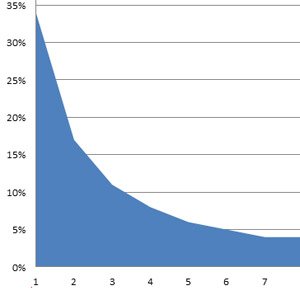Search Traffic Dropped Like a Stone? Here’s why!

Google’s Penguin 2.0 update rolled out on May 22nd and there has been a lot of discussion about site owners losing search traffic.
This got me thinking – not everyone follows Google’s updates and most drops in traffic tend to go by without the site owner really resolving the problem.
The fact is that this isn’t the only update or technical issue that has plagued webmasters and bloggers over the years and unless you keep on top of industry news then you can potentially miss out on some valuable information that could reveal the reason behind any loss of search traffic.
In the following post I will highlight some of the main Google updates and a number of different technical issues that could affect your search traffic.
If you’re thinking “well, I haven’t lost any search traffic”, that’s awesome but if it did happen would you be able to identify the reason behind it so you could take steps to fix the problem?
If the answer is no, then carry on reading.
March of the Penguin 2.0
The penguin update deals with external or off site link building and essentially targets sites using spammy techniques to manipulate search rankings.
Most recently, Penguin 2.0 rolled out and reportedly affected 2.3% of search queries – doesn’t seem a lot does it? Yet there was a huge amount of chatter from webmasters who had been hit.
Initially Penguin 1.0 caught a lot of webmasters with over optimised anchor text who were getting links from questionable sources.
Now Penguin 2.0 has gone deeper to find more nasty links to deep pages.
If your traffic dropped on or around May 22nd then chances are that you have been hit by the update, but just because your traffic dropped doesn’t mean that it was because your links were devalued, it could just be because you’ve lost out to big brands as this update does seem to favour big brands more.
Moving forward you need to be careful with anchor text, when you look at your anchor text on the whole, such as in Google Webmaster Tools or Majestic SEO for example, you need to be seeing a lot of branded anchors and raw URLs.
Christoph Cemper has published some case studies on sites that were severely hit by Penguin 2.0, I recommend having a read of the case study on Reeds.com.
If you believe you have been hit by Penguin 2.0 then I suggest following this process:
- Identify the poor quality links
- Attempt to contact site owners to take down the links
- Devalue the links using the Google disavow tool
- Submit a reconsideration request (Cyrus Shepard noted that it’s suspected that for Google to take your link disavows into consideration you must either wait for the next penguin update or submit a reconsideration request)
I’ve discussed the problem and how you can potentially recover, what about link building moving forward?
I’d start by looking at the tactics that you’re using to build links, remember now you need to be smarter and think about what will work in the future, not just what will work now.
What tactics should be avoided?
- Article marketing
- Wiki links
- Web 2.0 link wheels
- Social bookmarking (Submitting 1000 social bookmarks to sites that have “submit social bookmarks” in the title should be avoided)
- Paid links
- Low quality directory submissions (high quality directories may still be worthwhile, but you need to ensure that you have some sort of editorial process and don’t just accept any rubbish that is submitted)
What sort of tactics should we focus on?
This isn’t an exhaustive list, but you should focus on adding value to the web and if possible building links that can drive traffic.
- High quality guest posting
- High quality infographics (Matt Cutts isn’t fond of this and it’s nothing new but if done right it can be very effective)
- Earning links through great content
This goes further than just what types of tactics to use, because we now need to think about the link itself – is there any point in it actually being there? Does it add value?
Before penguin 2.0 hit, Jason Brooks published a great piece on the types of links that will work post penguin.
Moving forward you need to be thinking of the types of links you’re building, sure it means spending more time and putting more thought and creativity into things but that’s exactly what everyone else will have to do.
Panda
It’s been a while since Panda first rolled out and we’ve had subsequent Panda refreshes, but now Panda is incorporated into Google’s algorithm so identifying a Panda related issue can be very difficult.
Panda targeted on page content and mainly looked at the quality of content, things like duplicate content, thin/low quality pages and the use of old skool black hat tactics like doorway pages were the types of things that were targeted.
There has been a lot of talk about how Google hates “affiliates” which I believe is something that has been twisted and taken out of context.
If you’re an affiliate and you believe you were hit by Panda at some point, chances are that it’s not simply because you are an affiliate but something down to the quality of your content or maybe even a technical issue with your site.
If you’ve been hit by Panda I suggest you start by looking at your site from the perspective of a visitor and thinking about the user experience and how much value someone can get out of your website.
If you write detailed content that’s informative and includes rich media (videos and images for example) then this is exactly what Google is looking for.
Generally speaking, if you write a 2500 word article, chances are you’re going to rank higher than if you were to write a 400-500 word article.
I’m not saying flesh out the article unnecessarily and end up waffling, but add real detail – You’ll also keep users engaged for longer.
Exact match domains (EMD’s)
Having a domain with exact match keywords in the name used to be quite a powerful ranking factor and it was thoroughly abused until Google released this update.
If you have a domain that exactly matches your target keywords then it’s possible that this could be the reason for loss in traffic.
This update rolled out on September 27th 2012 and despite that some people still attempt to use this as a tactic.
If your site was relying on the fact that it was an EMD to rank, then this would explain any drops in rankings.
Ultimately this just means that you need to work on other tactics, build the content out and start building/earning some good links and social activity – plenty of EMD’s still manage to rank for competitive terms.
The Venice update
There are a huge number of personalisation factors that Google use to change the way results are displayed, this goes as deep as even the browser you’re using and takes into account other major factors such as your physical location.
Google’s Venice update (rolled out on February 27th 2013) aimed to make search results more relevant to your local area meaning you don’t need to add a location on to the end of search phrases anymore.
Your location can affect results in a number of ways, but the main way would most likely affect you if the keywords you’re targeting relate to some type of offline service, for example – “property for sale”.
By default, your Google search location will be set to your location (or quite close to it) and so will then return results related to property for sale in your local area and could potentially display something called a “local pack” which pulls in local businesses that match your search query and have offices in your area.
It’s also possible that Google could pull in local news results if a query relates to something that’s been covered in the news.
Ads above the fold
This is an update that rolled out in January 2012 and focused on devaluing websites that used extremely heavy advertising above the fold.
This is a great idea in principal, I think the majority of us don’t mind ads too much, but there is a point where it becomes too over whelming and just kills the user experience.
Manual penalty
Not all updates are automatic, on certain occasions Google will go in and manually penalise your site.
This could be due to excessive use of spammy link building tactics or even old skool black hat tactics or it could even be because you got caught selling links. There have been a number of cases where Google have publically made examples of websites using these types of tactics (e.g. Interflora and iAcquire).
That’s not to say you can’t recover – Interflora managed to work their way back into Google’s good graces by putting a lot of effort into attempting to get links removed and iAcquire managed to sort things out too.
Botched redirects
I’m constantly surprised by how many so called web developers mess up redirects, I’ve known developers to annihilate a website’s traffic just by being lazy.
Imagine you have a website with a number of deep pages ranking for good key terms but you have a new site built on a different CMS and the new site is uploaded and instead of redirecting the old pages to the new pages when permalinks change, your developer redirects everything to the home page.
You can say goodbye to the majority of your rankings.
So always make sure that any old pages are redirected to their new pages with 301 redirects (301 redirects will pass any authority or link juice to the new pages). If there isn’t a new version of a page, redirect it to the most relevant page or a higher level page/category.
If some redirects need to be temporary then use 302 redirects, but other than that make sure 301 redirects are in place.
Accidentally blocking search crawlers
This may seem like a no-brainer but I’ve seen people put a site live and just forget to switch the discourage search engine setting off in WordPress or forget to remove the noindex meta robots tag.
If you have Google Webmaster Tools setup then you’ll get notifications of whenever the Google bot can’t access your site.
Summary
As you’ve seen, there are plenty of ways that could cause your search traffic and rankings to drop, admittedly, some of these aren’t going to be new to some of you, but as site owners and bloggers it’s easy for updates to roll out and be too focused on our content and community to really take a deeper look.
Which of these issues and Google updates have you had issues with in the past?
I’d particularly like to hear about how Penguin 2.0 has been for you.
I’d love to hear more in the comments.
 SEO is Evolving: Trend You Need to Know About [Infographic]
SEO is Evolving: Trend You Need to Know About [Infographic] Does schema.org Markup Really Improve Google Search Ranking Position?
Does schema.org Markup Really Improve Google Search Ranking Position? How SEO Services Can Help Increase Your Website Traffic
How SEO Services Can Help Increase Your Website Traffic The Impatient Newbie’s Guide to SEO
The Impatient Newbie’s Guide to SEO